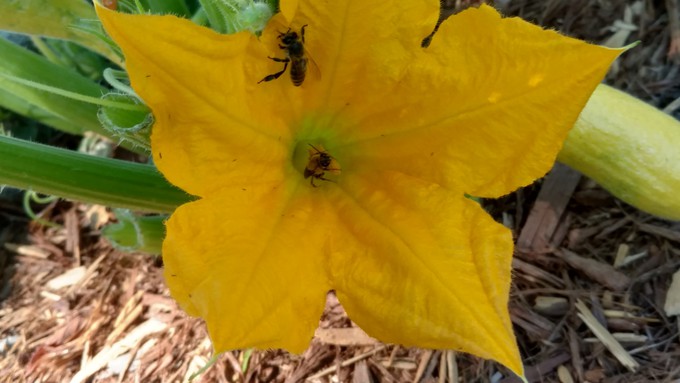
Placer County master gardeners show how to attract more beneficial insects, birds and bats (yes, bats) to your landscape

Squash blossoms need bees or other pollinators to produce squash, one of many crops dependent on outside help. Debbie Arrington
It’s time to talk about the birds and the bees (and butterflies, too). No, not that talk, but how we people can help wildlife while it helps our gardens, too.
A lot more critters than honeybees take part in flower pollination. Learn how to make pollinators feel at home in your landscape during the free workshop, “What's the Buzz about Pollinators?”
Offered by the Placer County master gardeners, this 90-minute class will be held at 10 a.m. Saturday, June 15, at the Roseville Utility Exploration Center (RUEC). The group will meet in the center’s courtyard to see nature in action.
“Bees? Please! Pollinators like bees, butterflies, hummingbirds and bats are an integral part of our ecosystem and are beneficial in the garden,” say the organizers. “Learn about the different pollinators and their life cycles, what plants attract these hard workers and how to provide for their habitat. Before you know it, your garden will be fluttering with life.”
This course is just in time for Pollinator Week, June 17-23. All of June is designated as Pollinator Month.
The workshop is open to adults age 18 and up. Although the class is free, registration is required. Sign up here.
RUEC is located at 1500 Pleasant Grove Blvd., Roseville.
For more classes and details: https://pcmg.ucanr.edu/.
Comments
0 comments have been posted.Sacramento Digs Gardening to your inbox.
Food in My Back Yard Series
May 6: Maintain soil moisture with mulch for garden success
April 29: What's (already) wrong with my tomato plants?
April 22: Should you stock up on fertilizer? (Yes!)
April 15: Grow culinary herbs in containers
April 8: When to plant summer vegetables
April 1: Don't be fooled by these garden myths
March 25: Fertilizer tips: How to 'feed' your vegetables for healthy growth
March 18: Time to give vegetable seedlings some more space
March 11: Ways to win the fight against weeds
March 4: Potatoes from the garden
Feb. 25: Plant a fruit tree now -- for later
Feb. 18: How to squeeze more food into less space
Feb. 11: When to plant? Consider staggering your transplants
Feb. 4: Starting in seed starting
Sites We Like
Garden Checklist for week of May 11
Make the most of the lower temperatures early in the week. We’ll be back in the 80s by Thursday.
* Plant, plant, plant! It’s prime planting season in the Sacramento area. Time to set out those tomato transplants along with peppers and eggplants. Pinch off any flowers on new transplants to make them concentrate on establishing roots instead of setting premature fruit.
* Direct-seed melons, cucumbers, summer squash, corn, radishes, pumpkins and annual herbs such as basil.
* Harvest cabbage, lettuce, peas and green onions.
* In the flower garden, direct-seed sunflowers, cosmos, salvia, zinnias, marigolds, celosia and asters. (You also can transplant seedlings for many of the same flowers.)
* Plant dahlia tubers.
* Transplant petunias, marigolds and perennial flowers such as astilbe, columbine, coneflowers, coreopsis, dahlias, rudbeckia and verbena.
* Keep an eye out for slugs, snails, earwigs and aphids that want to dine on tender new growth.
* Feed summer bloomers with a balanced fertilizer.
* For continued bloom, cut off spent flowers on roses as well as other flowering plants.
* Add mulch to the garden to maintain moisture. Mulch also cuts down on weeds. But don’t let it mound around the stems or trunks of trees or shrubs. Leave about a 6-inch-to-1-foot circle to avoid crown rot or other problems.
* Remember to weed! Pull those nasties before they set seed.
* Water early in the day and keep seedlings evenly moist.